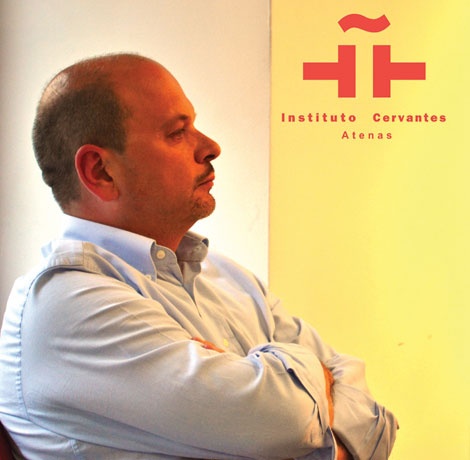Fátima Taboada López
Intern
Translator, writer, cultural mediator... That is Víctor Andresco, director of the Instituto Cervantes in  Athens since November 2012 and GRReporter and Fátima Taboada López had the chance of talking with him. Born in Madrid in 1966, he studied Slavic Philology and worked as a literary critic for the Spanish newspapers “ABC” and “El País”. After a year in Athens, he is very happy to be here and he recognizes that it will be hard for him to leave the city when he has to.
Athens since November 2012 and GRReporter and Fátima Taboada López had the chance of talking with him. Born in Madrid in 1966, he studied Slavic Philology and worked as a literary critic for the Spanish newspapers “ABC” and “El País”. After a year in Athens, he is very happy to be here and he recognizes that it will be hard for him to leave the city when he has to.
Is there a big demand for the Spanish language in Athens?
Yes, actually in Greece there is a big demand for foreign languages and traditionally the Greeks love the Spanish language. We do not have as many students as before but I think every academy and cultural centre faces the same problem because the situation now is not that good. We have 1,000 students who attend our courses every year and more than 4,000 students who pass the test to obtain the DELE (Diploma of Spanish as a Foreign Language). In Greece, it is very important and common to have language certifications. In Athens, 4 or 5 years ago, there were 6,000 students taking the exam annually.
What kind of initiatives have you undertaken to improve the Instituto Cervantes of Athens?
We want to give a balanced view of the Spanish language. We promote the language but also the culture and we have the support and help of the Latin American embassies, especially of Mexico, Venezuela, Argentina and Chile. That makes us give an overview of the Spanish standard language because sometimes people forget that Spanish is not the language that we speak in Spain alone, but there are more than 500 million speakers in more than 20 countries. People think that we are a disaster in politics but great in sports, and there are some things missing such as our language and our culture, which are very attractive. This is difficult because there are a lot of cultural centres in Europe that also compete to promote their languages. We need to show the Greeks that Spain is the gateway to Latin America, which is a very important emerging economy.
What kind of events or activities does the centre organize?
We hold something called "dramatic readings" of Spanish stage plays in Greek so that people come and get an idea of what is happening in the Spanish contemporary theatre. In the upcoming months, we will have 6 readings of authors such as Juan Mayorga or Sergi Belbel. We also have Spanish à la carte cinema where people choose, via Facebook, what they would like to watch and we show it. We also collaborate with the Greek film library and Latin American embassies and make film series with them. We organize commemorative acts too; we will perform one with the help of the Argentinean embassy coinciding with the anniversary of the birth of Julio Cortázar. There will be an important festival in June, which is the LEA (Latin American Literature in Athens), and we participate in it every year. We are also interested in alternative forms of financing such as crowdfunding, so we help young directors by showing their films at our centre. We try to do dynamic things, because if you just organize conferences with important authors, people get bored. On 6 March we will host a tribute to Emilio Pacheco, who is much loved here in Greece. I would also like to mention our library, where we organize different activities. We also try to promote authors who are well known in Spain but not here because they have not been translated yet.
What kind of similarities and differences do you see between Spain and Greece?
What I find most striking is that when you go down the street, it seems that they are speaking in Spanish because they have similar sounds and pronunciation and you feel at home. People love to be out in the streets, enjoying the sun and good weather just like the Spanish people, I think we are both very Mediterranean. The Greeks are very hedonistic, they like enjoying life and taking it easy, they love culture and I think we like to artistically waste time.
I was going to say that belatedness is a difference, but actually, that is a similarity with Spain. I would say the traffic is very chaotic sometimes, people do not use a helmet while driving a motorcycle and they smoke in all bars. They have difficulties in accepting European laws, because the laws are the same as in Spain but few people respect them. Sometimes there are accidents but the funny thing is that they start yelling at each other in a very aggressive way but in the end, nothing happens. In Spain, to the contrary, this might sometimes end in a tragedy.
Do you think that it is easy for a foreigner to get used to the city and the Greek habits?